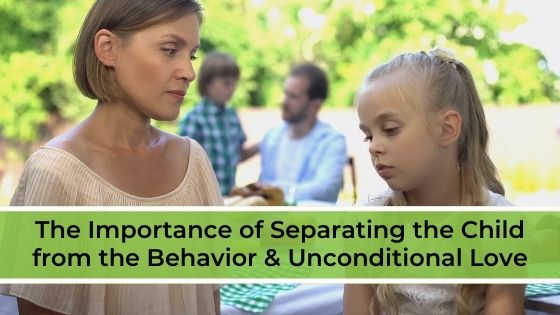The most important thing in giving unconditional love to our children, is remembering to “separate the person from the behavior.” This means saying to a child, “When you misbehave, trust me, there will be consequences. However, you are my kid, and I love you. And I want you to know that there’s nothing you could ever do that would keep me from loving you.” This gift of unconditional love allows a child to value herself in spite of her imperfections, and it’s the key element in building high self-esteem. Separating the person from the behavior—loving a child for who she is rather than for what she does––is the greatest gift an adult can extend to a child.
To do that, we must avoid the use of labels. An unfortunate result of equating a child with the child’s behavior is the temptation to label the child based upon that behavior. When our kid lies to us, we are tempted to label him a liar and then go on to tell him, “I’ll never be able to trust you again!” The trouble with labels is that they often become self-fulfilling prophesies. A kid who is told he cannot be trusted will likely become untrustworthy. It’s like the old saying, “Brand a child a thief, and the child will become a thief.” It is amazing how accurately our children reflect our expectations of them. It is very important that we never label a child on the basis of her behavior.

When I was twelve, my hero was Tarzan, King of the Jungle. I read every Tarzan book I could get my hands on. That summer, I was assigned the duty to weed our front yard. Daddy gave me a tool with a long wooden handle and a little metal fork at the end of it. It looked like a spear. I started digging up weeds and looked across the lawn and spotted a snake. Actually, it was a black hose connected to a lawn sprinkler; but it sure resembled a snake. Tarzan flashed through my mind: I must kill it! Casting my spear, I nailed that snake over twenty times. It was great fun—until my father came home. He turned on the hydrant, and the snake became a sprinkler hose with water shooting out everywhere I had speared it. Dad sized up the situation, with me standing there, spear still in my hand, and asked, “Why did you do that, Glenn?” I explained my Tarzan fantasies and said I was sorry. Dad simply said, “Don’t do it again.” The next day, I’m out digging weeds and spotted a new snake in the yard. Tarzan to the rescue! I began launching my spear.
Dad returned home that evening and again was greeted by another sprinkler hose when he turned on the water. This time, discipline was administered; but Daddy didn’t label me. He might have thought it, but he didn’t call me dumb or stupid. He disciplined my behavior while still honoring me as a person. That’s great parenting.
When I was growing up, my best friend Ray had dyslexia. I remember, in the second grade, watching his mother sitting on their couch with him, going through the basic reading books, “Ray, the word is ‘the.’” Remember, it’s the same word we went over in the last sentence.” Or, over and over, I would hear her say, “Ray, that word is ‘and.’” His parents ended up holding him back in the second grade. However, never once did they label him. As it turned out, he ended up earning an MBA and has an amazing mind for business, becoming founder and president of a multi-million dollar corporation. I don’t think Ray would have risen to that potential if he had been labeled as “slow” or “dumb” as a child. So again, never label a child on the basis of his behavior.
A more constructive approach in dealing with a child who, for example, is caught in a lie is to say to the child, “I am disappointed that you lied to me. You and I both know you are an honest person; and, while it will take time, we will learn to trust each other again. Now, here are the consequences of your inappropriate behavior….” We can then discipline the unacceptable behavior (with age-appropriate consequences) while still affirming the worth of the child.

I was in a parenting group once where we were discussing this concept of separating the person from the behavior. One woman said, “I can’t go along with this business of not labeling our kids. My daughter has stolen money from us. She’s a thief. She lies to us about seeing her boyfriend whom we don’t like. She’s a liar. She also sneaks out of her window at night after the lights are out in order to go and be with him. So she’s a sneak. What do you say about that?” The room got really quiet. Everybody was sort of stunned. But, after a few moments, a man named Jim spoke up and said, “You know, when I was in my teens, I lifted a few bucks out of my dad’s billfold a couple of times. And, I lied about seeing this girl I liked. But my folks never labeled me a thief or a liar. And today I’m an elder in my church.” Then, another woman in the group said, “When I came home from college after my sophomore year, I still had a midnight curfew. So, several times that summer, after my parents had gone to bed and the lights were out, up would go my window; and I would climb out and go be with my friends. I got caught, but my parents never labeled me as a sneak. And, today, I’m a minister’s wife.”
Some of the world’s most loving and responsible adults admit to occasional behaviors such as lying, stealing, and slipping out of the house at night during their teenage years. Kids are going to test the waters, and we need to be careful not to place labels on them that might become self-fulfilling prophecies. The behavior does not define the person. While they are going to make some bad choices, our kids are persons of infinite worth.
Separating the child from her behavior and valuing the child for who she is rather than what she does is the most important task of the parent. This gift of unconditional love provides the child with the high self-esteem and the positive self-concept that make the human journey an exercise in fulfillment and joy.

- Choosing the Right Parenting Class: A Guide for New Parents - February 22, 2023
- 5 Reasons Why Every New Parent Should Consider Taking Parenting Classes - February 18, 2023
- Kids Who Feel Loved Don’t Shoot Up Schools - July 25, 2022






Leave a Reply